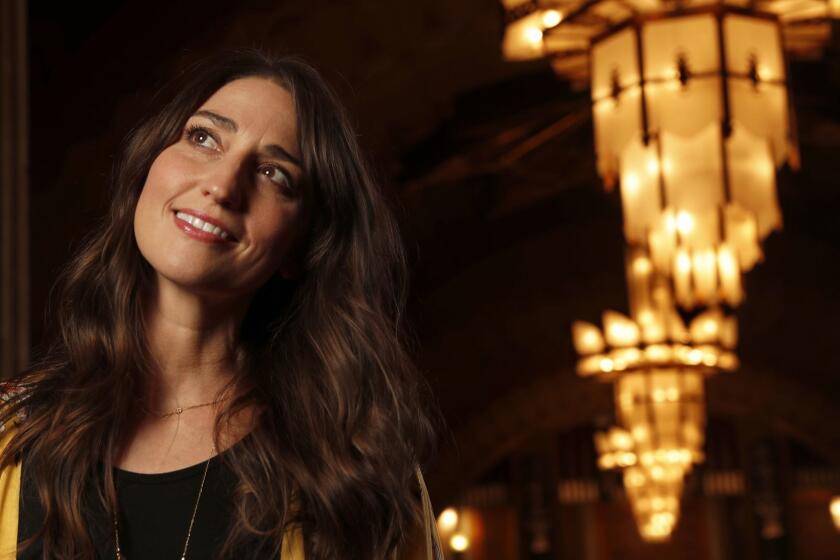‘Little Voice’ is a pop song in the form of a TV show. You’ve been warned
- Share via
In case you‘re wondering, “Little Voice,” a feelings-packed new series premiering Friday on Apple TV+, shares almost nothing — other than a singer initially defined by insecurity — with the 1998 British film of the same name. More to the point, for the show’s target audience, it also shares its title with the 2007 major-label debut of Sara Bareilles, who has created the series with filmmaker and screenwriter Jessie Nelson, her collaborator on the hit Broadway musical “Waitress.”
We are in New York City, where the show’s executive producer J.J. Abrams long ago set “Felicity,” another romance about a curly-haired young woman getting her act together. Brittany O’Grady plays Bess, writing songs that voices never share, including her own: “I don’t like anyone listening to the songs that I write,” she tells Ethan (Sean Teale), the aspiring filmmaker and Jude Law sound-alike whose public-storage-locker editing bay is next to Bess’ studio/fortress of solitude. “They’re for me.” (And for her dog, a master of soulful looks and cellphone fetching.) This will change, or there is no series.
For the record:
12:14 p.m. July 10, 2020Sara Bareilles’ first name was misspelled Sarah.
To pay for this whimsical office space, Bess walks dogs, the most humorous of all day jobs, but also, in montage, gives music lessons, sings for seniors and tends bar at a low-key pop ’n’ folk cabaret where her own artistic ambitions are taken less than seriously, an opinion she is more liable to reinforce than rectify. She’s all side hustle and no main hustle.
Apple’s flagship series “The Morning Show,” about the fallout from sexual misconduct at a morning show, reaches operatic pitch: not quite believable yet emotionally satisfying.
That Bess’ music sounds, reasonably enough, like Bareilles’ — a brand of piano-based balladry that has been popular in our world for nigh on a couple of decades — does not make her seem exactly cutting-edge. (In most respects, the series is more old-fashioned than newfangled, a traditional, time-tested sort of backstage drama.) Bess watches old interviews of Aretha Franklin and Joni Mitchell on her phone and says she feels like she was born 50 years too late. Asked to describe herself in terms of known quantities, she goes generationally wide: “Alessia Cara meets Carole King meets … Betty White?” (“She really likes dogs.”)
“I think my stuff sounds, I don’t know, earnest,” she says, as if that no longer worked somehow. Still, the songs that are most meant to grab you do, and O’Grady is a fine singer who, when she is in full flight, does make you feel that there is nothing so fine as to be a person who can sing.
The bigger problem is that Bess is suffering what her best friend Prisha (Shalini Bathina), who plays in an all-woman mariachi band, calls “PTSD” from, seemingly, the one time she did try to share her music and was poorly received. Prisha is keeping part of herself from public view too; it’s not because “he says ‘anyways’ too much” that she rejects a cute gentleman caller early in the season.
It is true that some artists have balsa-wood egos and that stage fright is real, and Bess is one of those fictional artists for whom self-expression is portrayed as a compulsion, a burden even, rather than a kick. Much of the time she seems to be getting no fun at all out of music, either from her own perfectionism or a propensity to push back at collaborators. Still, as the show progresses, we do get hints that she is suffering other lingering effects of her backstory, which has a habit of becoming her front story, and that she is, after all, on a journey toward self-awareness that the series holds back for dramatic effect. It’s not all her fault!
Sara Bareilles has spent the last five years of her life working almost exclusively on the musical “Waitress.”
If Bess is unsure about her talent, no one close to her is, and most everyone wants her close: Along with Ethan there are Samuel (Colton Ryan), a guitarist who hears her sing and wants immediately to collaborate, and Bennie (Phillip Johnson Richardson), her co-worker — “a waiter with six online degrees” — and pro bono promoter. Also competing for her attention are a brother, Louie (Kevin Valdez), who is autistic and obsessed with Broadway theater, and whose vibe and volume is oddly reminiscent of Billy Eichner; and a father, Percy (Chuck Cooper), a legendary Could Have Been a Contender who sings doo-wop and dispenses wise advice from a subway platform. Really, the show might well have been called “Everybody Loves Bess (but Bess).”
All this adoration will create tension and conflict and episodes of inchoate moodiness among them, of an almost secondary-school intensity, and at times expressed exactly in the terms of a music video — which is to say, there is an audience for it.
In recording-studio terms, one would say that the needle on the emotional VU meter is pegged to the right, in the red; the volume is turned way up here, even when the performance itself is whispery and crafted to sound casual. Like the music that Bess/Bareilles makes, it builds something big out of small feelings, and something small out of big ones — the intimate moment pitched to the back row of the theater. It can be a little wearing over the seasonal long haul, but it is true in its way to our sentimental experience and why nothing succeeds in working us up, and working us over, quite like a pop song.
More to Read
The complete guide to home viewing
Get Screen Gab for everything about the TV shows and streaming movies everyone’s talking about.
You may occasionally receive promotional content from the Los Angeles Times.








